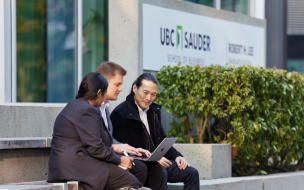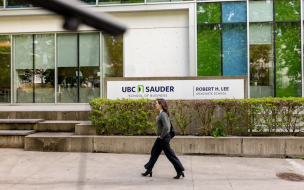According to the Graduate Management Admission Council (GMAC), 75% of full-time, two-year MBA programs with 120 students or more reported a growth in applications from women in 2016. The majority of full-time, two-year MBA programs are based in the US.
At Temple University’s Fox School of Business, 55% of MBA students are women. At the University of South Carolina’s Darla Moore School of Business, 52%.*
Yet women are still under-represented on most full-time MBA programs. And just 37% of all full-time, two-year MBA program applicants in 2016 were women.
Syracuse University’s Martin J. Whitman School of Management has experienced percentages of women on its full-time MBA program more typical of US business schools across the board – increasing slowly but steadily from 30% for 2014’s intake, to 32% for 2015, and 39% for 2016.
Shri Ramakrishnan, assistant director of graduate recruitment at Whitman, recalls that when meeting with prospective students at MBA events, she sees equal numbers of men and women.
But after that, something happens. Female candidates stall and don’t submit their applications. Women are falling off the applicant funnel.
Solving the funding problem
Why? One reason might be the cost of an MBA. Whitman’s full-time MBA costs $78,000 for two years of tuition. Some US-based MBA programs can cost upwards of $100,000.
In March this year, GMAC released an International Women’s Day white paper based on a survey of 5,900 business school applicants.
38% of female survey respondents in the US cited financial reasons as the key reason why they had not yet accepted their admissions offer to business school, compared with 20% of male respondents.
Arizona State University’s WP Carey School of Business is tackling the MBA funding problem head-on. In 2016, it launched its new Forward Focus MBA, with the university covering the entirety of all incoming MBA students’ tuition.
Applications sky-rocketed from around 500 in 2015 to 1,159 in 2016. As well as boosting numbers of international MBA applicants, WP Carey increased its female MBA population from a plateau of 30% to 43% in 2016.
For the duration of the two-year MBA program, WP Carey students give back to the school by working on research projects, new infrastructure, or running student clubs.
“The idea is that we’re investing in our students,” says Pam Delany, the school’s director of graduate admission and recruitment. “With the scholarship that we offer we’re able to open our doors to people who may not have ever considered applying to a full-time MBA because of the cost.”
At WP Carey, the drive to open up more opportunities for women in business comes right from the top. The school’s dean, Amy Hillman, is one of the few female business school deans in the US. The school’s senior leadership team is also predominantly female.
“Our students come and they see female leadership in action – that helps set the tone,” Pam explains. “Our women MBAs are supported to go to leadership conferences. We have an active women in business club. All our full-time MBAs have executive coaches.
“We can’t just attract women and admit them; we have to provide them with the resources while they’re here. Male or female, we have to provide MBA students with an experience that allows them to explore who they are as future leaders.”
An enabler for women in business
Like many US business schools, WP Carey is a member of the Forte Foundation, a non-profit consortium of leading companies and business schools devoted to promoting women in business.
Since its launch in 2001, Forte Foundation has dished out $110 million in fellowships to 5,000 female MBAs, bolstering numbers of women in business school.
Rebekah Lewin, assistant dean of admissions and financial aid at the University of Rochester’s Simon Business School, enrolled on the MBA program there herself back in 2000. Then, the percentage of women in the MBA class was around 25%. Now, it’s 34%.
“It’s been a gradual increase,” she says. “We joined Forte more than five years ago and that has been an opportunity to identify more talented women.
“I attribute a significant portion of my career success to be rooted in the MBA,” she continues. “I would love to see more women that are in the early stages of their career both understand the value proposition of an MBA, and pursue the MBA to grow their career advancement potential.”
How far is the MBA an enabler for women in business? Does the MBA give women access to higher-level roles in industries traditionally occupied by men? “Absolutely,” says Rebekah.
“It’s a combination of having the credentials, the confidence, as well as the network of individuals that can mentor, sponsor and support you as you are growing and developing your career. All those things are important for women as they look to advance.”
A shallow pool?
For Rebekah, the biggest challenge in recruiting women to the full-time MBA program at Simon is simple: the female applicant pool is a smaller pool to fish from – 37% of two-year, full-time MBA applicants were women in 2016 according to GMAC, 63% men.
Whereas, for online MBA programs, 43% of applicants in 2016 were women. For specialized business master’s programs in management, marketing, and accounting: 52%. Full-time MBA programs face competition from shorter, more flexible, more affordable programs better suited to an active family life.
“I think sometimes women are more risk averse to leaving a stable job, income, and making an investment in themselves,” Rebekah continues. “They may not realize that there are scholarship programs available, or what the growth potential of an MBA is.
“Part of the partnership with Forte is about getting the word out to women earlier in their career – even encouraging women to take the GMAT at undergraduate level – so that the perceived barriers to business school are no longer there.”
Laurel Grodman, director of admissions at Yale School of Management, agrees. “The challenge is growing the pie overall,” she says. “We hold programs for women early in the consideration process to encourage thinking about the MBA as a viable degree.”
Laurel started her MBA at Yale SOM in 2004. “There are more women in the classroom now,” she says. “We’ve seen the percentage of female applicants trickling upwards, about 1% per year. It’s a slow movement but still encouraging.”
334 students make up the total enrollment for Yale SOM’s class of 2018. 43% are women.
“The MBA is an incredibly versatile degree,” Laurel continues. “While many students will enter their MBA program with some sense of short-term plan, I think the real value comes over the breadth of your career – encouraging you to break down silos across industries and functions.
“I worked in the private sector after graduation and then moved into the non-profit space. Making that kind of move felt natural in a way that I’m not sure it would have had I not had the foundation of an MBA.
“I’m hopeful that having more representation of women in business schools makes graduating students more mindful about how to value everyone within an organization; women and men.”
Signs of progress
Historically, progress has been slow. But now, US business schools are making significant strides in increasing numbers of women on MBA programs.
The current MBA class at Northwestern University’s Kellogg School of Management has more women in it than ever before. Kellogg’s latest intake was 41% female.
The school engages with prospective female students through the on-campus Women’s Business Association and Women’s Preview Days. It’s also launched a five-week Women’s Leadership Seminar to prepare its female MBA students for their post-MBA careers. Over 120 women MBAs participated in the inaugural seminar last Winter.
“We take a proactive approach, engaging with prospective female applicants in an effort to raise awareness of Kellogg as an outstanding choice for women,” says Melissa Rapp, Kellogg’s director of full-time MBA admissions. “It’s something we’re very proud of.”
*Based on data from the Financial Times Global MBA Ranking 2017
RECAPTHA :
34
5a
cc
36












